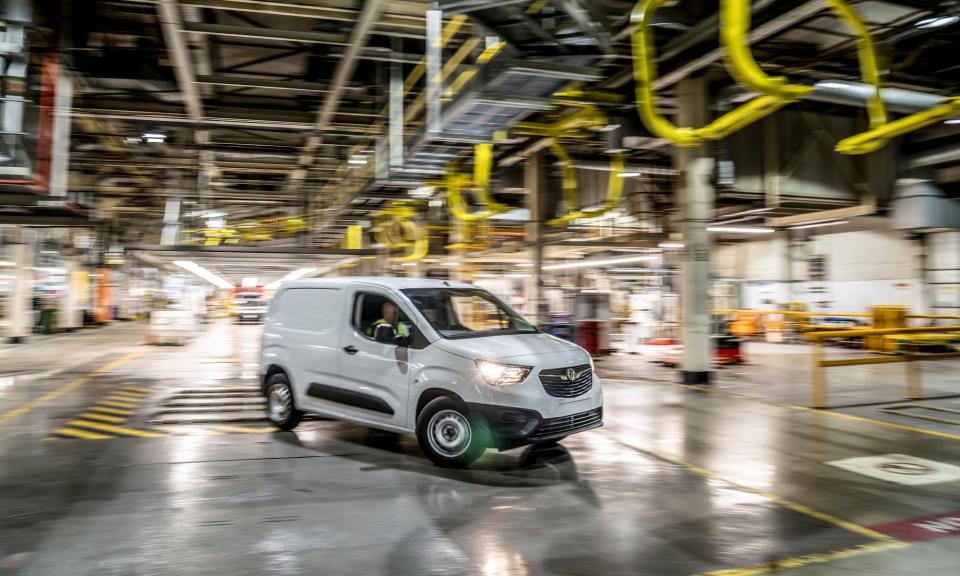Vauxhall owner says car plants could shut unless ‘stupid’ UK rules change

The owner of the Vauxhall, Peugeot and Citroën brands has warned its car plants in Ellesmere Port and Luton could close unless market demand for electric vehicles and “stupid” regulatory conditions change.
The UK managing director of Stellantis said the company did not want to shut operations in the UK but it would make a decision in “less than a year” in the face of unreasonable government sales quotas and lack of consumer incentives in relation to VAT on vehicles and electricity.
“You have to make strategies that are based on efficiency. I want to keep the production [in the] UK and I want to be clear on this,” Maria Grazia Davino said.
Related: Volvo does a sharp U-turn as the boxy estates and saloons return to Britain
She added that the demand for EVs was “soft” and unless there were further incentives for businesses to buy the electric commercial vehicles or more support from the government it may have no choice.
“The demand is not coming. We expect the government whoever it is to respond to this. We work together in the country for the benefit of the health of economy and the people,” she said.
“Whoever gets to the government they have to listen … In the UK there will be consequences for sure on the production. Stellantis UK does not stop. Stellantis production in the UK could stop.”
The warning comes weeks after the chief executive of Stellantis criticised the government’s EV policy as “terrible”, saying it could ultimately lead to car manufacturing facing bankruptcy.
Carlos Tavares blamed the UK’s quota system, which forces manufacturers to meet sales targets that he said were “double” the market demand. The so-called zero emission vehicle (ZEV) mandate forces manufacturers to sell an increasing proportion of electric cars.
The ZEV mandate applies to all car sales, whether made in the UK or imported, so it is unclear why it would force a manufacturer to shut down British plants that export significant volumes. However, Stellantis wants the electric vans it makes in those factories to count as cars for the purposes of the ZEV mandate. That would make it much easier to hit the targets.
Before the election was called, a government minister said there was little to no prospect of any changes to the ZEV mandate this year.
It is the second time in a year that Stellantis has questioned the viability of factories at Ellesmere Port in Cheshire, where it produces electric vans and cars after a £100m investment, and Luton, where it produces larger petrol and diesel vans, with electric versions to come next year.
Earlier this year, the UK and European industry averted “cliff-edge” tariffs on imports and exports of EVs across the Channel because of a clause in the Brexit trade deal that was suspended for three years after pressure was put on EU leaders from manufacturers in Germany, France, the UK and elsewhere.
The renewed closure threat will put pressure on Labour, which polls suggest will win the general election next week, to give carmakers more leeway. Davino said they had yet to have any talks with the potential new chancellor, Rachel Reeves, or prime minister, Keir Starmer.
“We care about the employees. They are the reason why we work actually so hard. I work to keep my staff here and this is why I am advocating personally so much,” Davino told reporters at a conference organised by the Society of Motor Manufacturers and Traders, a lobby group, in London.
She said the government’s EV policy was affecting its business model, forcing it to “invest more” than the market demands, amid plateauing electric sales, making the justification for remaining in the UK less viable than plants elsewhere around the world.
She said a number of measures could help increase demand, including a reduction in VAT on the price tag at the forecourt and on energy, a more robust network of charging points around the country and insurance incentives.
If the customer did not see an “advantage” in buying an EV they would continue buying conventional petrol or diesel vehicles, she said.
Ashley Andrew, the president of Hyundai Motor UK, called on the government to “half the VAT” on EVs for consumers, which is now at 20%.
He also said if EV rollout was to accelerate, the differential in VAT on energy had to be addressed, as those who have a driveway and charging point benefit from a 5% rate, much lower than those forced to use the public network.
Stellantis started electric-only production at Ellesmere Port in 2023, making it the company’s first plant globally dedicated to such vehicles. From this year, it is also producing a range of electric passenger vehicles including the Vauxhall Combo Life Electric, Peugeot e-Rifter and Citroën ë-Berlingo multi-purpose vehicles.
Des Quinn, national officer for Unite, a key union representing car factory workers, said he would back a new government easing the ZEV mandate for those car companies that invested in the UK.
“There’s got to be a balance,” he said. “I would give a bit to take something back in terms of automotive sector and industrial strategy.”
The government has been approached for comment.

 Yahoo Finance
Yahoo Finance 